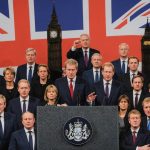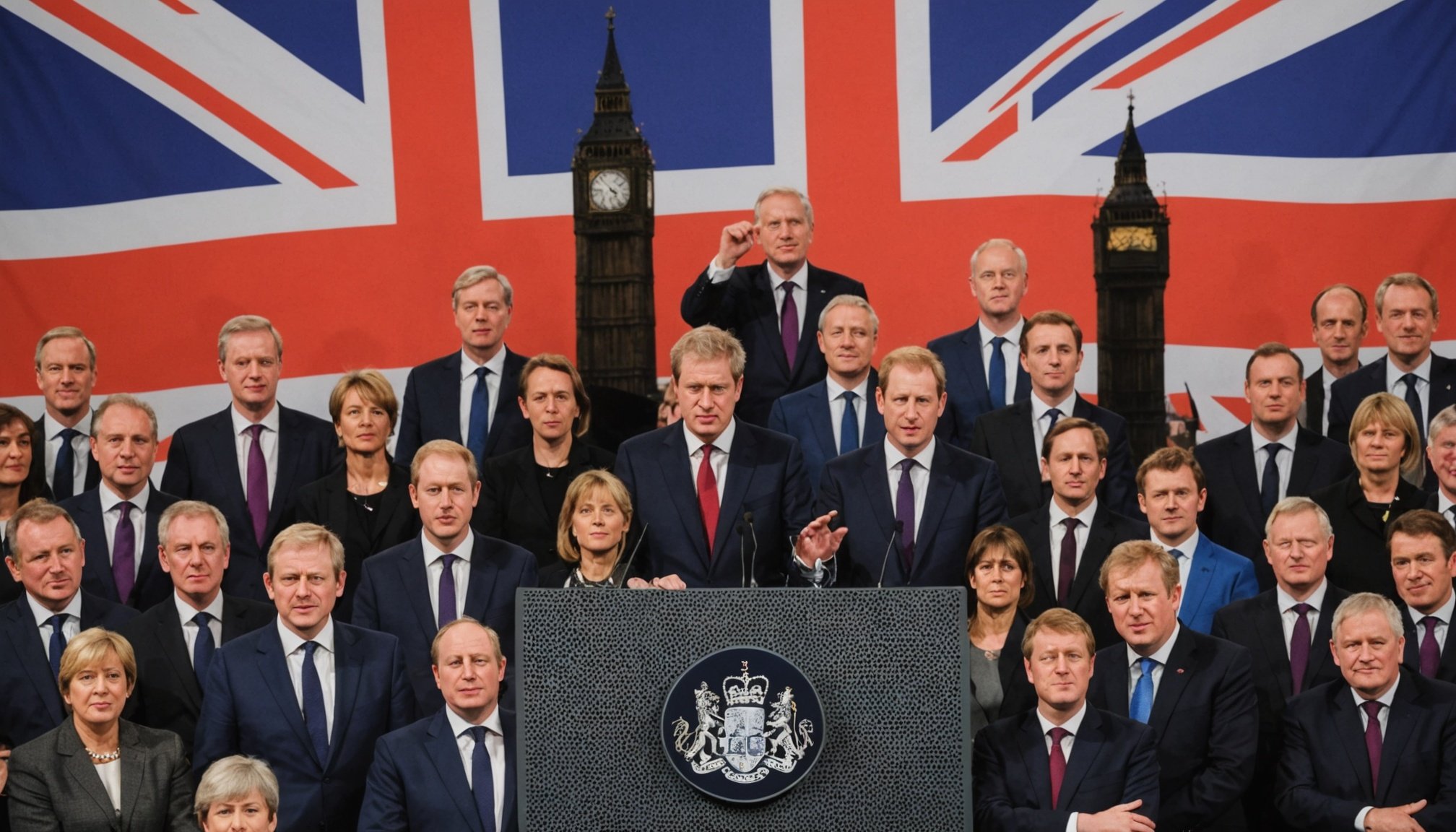Overview of the Current UK Political Landscape
The UK political dynamics have been marked by significant flux, reflecting both longstanding traditions and novel challenges. Recent political events reveal a landscape shaped heavily by economic pressures, social policy debates, and the aftermath of Brexit. These dynamics continue to evolve, influenced by multiple internal and external factors.
At the heart of these developments is the ongoing negotiation between government accountability and public sentiment. Political influences in the UK involve not only party strategies but also voter reactions to policy effectiveness. Shifts in party standing often coincide with wider societal concerns, such as cost of living and healthcare, demanding nuanced approaches from leaders.
Have you seen this : How Are British Regional Newspapers Adapting to the Digital Era?
Major trends shaping the landscape today include the growing role of smaller political parties challenging the historical dominance of the traditional two-party system, and a palpable increase in regionalism driving demands for devolved powers. This interplay between established power centers and emerging voices reflects a political environment striving for balance amid change.
Furthermore, external pressures such as international relations and global economic shifts compound the complexity of UK politics. These factors intertwine with internal debates, reinforcing the need for adaptable governance. In summary, the recent political events and ongoing shifts illustrate a UK political landscape defined by both challenge and dynamic transformation.
Also to discover : How Will Recent Changes in the UK Impact Local Communities?
The Role and Influence of Key Political Parties
Understanding the political parties UK landscape requires examining the current party leadership and power structures that dominate Westminster and beyond. The major parties—the Conservative Party, Labour, and the Liberal Democrats—continue to shape policy and public discourse significantly. However, smaller parties such as the Scottish National Party (SNP), the Green Party, and others have grown in influence, challenging traditional dominance and altering the power balance in UK politics.
Leadership within these parties directly impacts their public image and policy priorities. Changes at the helm often reflect or provoke shifts in voter support, affecting the overall political climate. Party leaders are central to maintaining cohesion and directing strategies during election cycles and parliamentary challenges.
The dynamic between government and opposition is key to policy-making. Opposition parties scrutinize government proposals, offer alternatives, and influence legislation both inside and outside Parliament. This interplay ensures a system of checks and balances, driving negotiation and compromise. For example, opposition effectiveness can sway public opinion, which in turn pressures parties to adapt policies or leadership styles.
Importantly, the rise of smaller political parties has fragmented the traditional two-party system. This evolution reflects broader UK political dynamics, including regional aspirations and shifting voter priorities. These smaller parties often focus on specific issues or regional interests, thereby diversifying the political agenda and fostering debates on topics that might otherwise receive limited attention.
In summary, the role of political parties UK is central to understanding the present landscape, where leadership, shifting allegiances, and an active opposition shape the direction of national policy and public discourse.
Brexit’s Enduring Consequences
Brexit impact remains a defining feature of the post-Brexit UK political landscape, affecting both economic and diplomatic arenas. The economic ramifications of Brexit are multi-layered, involving disrupted trade flows, changes to supply chains, and modifications to regulatory frameworks. These disruptions have contributed to inflationary pressures and uncertainty in markets, shaping policy responses across government sectors.
Post-Brexit UK foreign and trade policy has witnessed notable shifts. The UK government has sought new trade agreements beyond the EU, striving to bolster global partnerships, yet ongoing negotiations reveal unresolved Brexit issues, particularly concerning Northern Ireland’s protocol and customs arrangements. These challenges highlight continued friction within and beyond UK borders, emphasizing the complexity of disentangling longtime EU ties.
Brexit impact also permeates political influences within the UK, as it alters voter sentiment and party strategies. The evolving EU relations continue to provoke debate within political parties UK and among regional governments, influencing both national cohesion and international stance. Ultimately, Brexit’s enduring consequences demonstrate its centrality to understanding current and future UK political dynamics.
Leadership Changes and Their Impact
Recent shifts in UK political leadership have notably influenced the direction of national policy and party dynamics. Changes such as the appointment of new Prime Ministers (PM changes) and internal party leadership contests often trigger policy realignments and recalibrations of political strategy. For example, leadership turnover can lead to shifts in priorities ranging from economic reform to foreign relations, reflecting the incoming leader’s agenda.
Public response to leadership instability is mixed but generally marked by heightened scrutiny and fluctuating voter confidence. Such instability may erode trust in government effectiveness, affecting general UK political dynamics. Conversely, fresh leadership can energize party bases and sway undecided voters, temporarily boosting party standings in polls and elections.
Leadership changes also impact the balance of power within parties. Internal contests may expose or deepen divisions, affecting cohesion and the party’s capacity to present unified policies. This, in turn, influences broader political influences across Westminster and beyond, as opposition parties seize opportunities to challenge government vulnerability.
Overall, PM changes and leadership turnovers remain critical moments within UK politics, shaping both immediate policy outlooks and longer-term political trajectories.
Shifting Public Opinion and Electoral Trends
Understanding UK public opinion is crucial to grasping the current political climate. Recent polls reveal fluctuating voter sentiment influenced by economic concerns, social issues, and leadership perceptions. For instance, cost of living pressures and healthcare debates heavily shape how citizens assess party platforms and government performance. These factors directly impact electoral behaviour, as voters navigate between party loyalties and immediate policy relevance.
How do changing social attitudes alter voting patterns? As social priorities evolve, support often shifts towards parties addressing pressing community needs or advocating for systemic reforms. Emerging issues like climate change, social equality, and regional autonomy have begun to influence voter decisions more prominently, creating space for smaller political parties alongside traditional ones.
Trends in recent political events demonstrate a rise in voter volatility and strategic voting. This reflects broader societal fragmentation and issue-based political engagement rather than unwavering party allegiance. Particularly in marginal constituencies, shifts in public opinion can decisively affect election outcomes, emphasizing the role of grassroots campaigning and targeted messaging.
In summary, the interplay between UK public opinion and electoral behaviour underscores a political landscape responsive to both enduring and emerging social concerns. Tracking these patterns remains indispensable for anticipating future political influences within the UK.
The Influence of Social and Economic Issues
The UK economy currently faces a host of challenges that deeply impact the political landscape. Inflation remains a pressing concern, eroding household incomes and shaping voter sentiment. Rising costs in essential areas, especially the cost of living, have led to widespread public anxiety. This economic pressure influences not only individual financial well-being but also the government’s budget priorities, forcing difficult trade-offs in public spending.
Employment figures also affect perceptions of economic stability. While some sectors experience recovery and growth, others face uncertainty, contributing to uneven economic confidence across the country. These fluctuations have direct consequences on political influences, as parties respond with policy proposals aimed at stimulating job creation and protecting social welfare.
Social policy challenges intersect closely with economic conditions. The healthcare system, strained by funding limitations and increasing demand, remains a central concern. Similarly, education and housing crises accentuate inequalities and provoke calls for systemic reform. These social issues compel political parties to develop comprehensive strategies addressing both immediate needs and long-term sustainability.
The interplay between economic challenges and social policy decisions shapes the wider UK political dynamics. For example, debates over welfare spending versus fiscal austerity highlight differing ideological stances and influence voter loyalties. Furthermore, policymakers must navigate competing interests to maintain public trust while ensuring economic growth.
In summary, the ongoing economic challenges—particularly inflation, employment uncertainty, and social service demands—constitute critical political influences driving recent political events and shaping the UK political landscape.
Regionalism and the Push for Devolution
Regional politics UK have become increasingly prominent, driven largely by nationalist movements and demands for greater autonomy. The Scotland independence movement exemplifies this push, with significant public support advocating for a second referendum. This reflects a broader desire among Scots for enhanced self-governance and control over local matters.
Similarly, Northern Ireland’s political landscape remains delicate, shaped by complexities surrounding the Brexit protocol and the region’s unique historical context. The balance between unionist and nationalist parties continues to influence governance, underscoring the ongoing negotiations related to border arrangements and power-sharing agreements.
Devolution in Wales, while less marked by independence debates, still evidences a growing assertion of regional identity and legislative authority. These variations highlight important political distinctions between Scotland, Wales, Northern Ireland, and England, contributing to a multifaceted national conversation about the future governance of the UK.
The impact of these regional dynamics on national political coherence is significant. Political influences from devolved governments often challenge Westminster policies, requiring nuanced intergovernmental collaboration. As demands for local decision-making increase, UK political dynamics reflect a tension between unity and regional self-determination, shaping recent political events and ongoing debates about the structure of the United Kingdom.
Media, Communication, and Public Discourse
The landscape of UK political media today is highly complex, blending traditional outlets with rapidly evolving digital platforms. These channels play a crucial role in shaping public discourse, influencing both voter perceptions and wider political debate. Traditional media—such as established newspapers, television, and radio—continue to scrutinise politicians and policies, holding them publicly accountable. This scrutiny affects political influences by shaping the narratives around government actions and opposition responses, ultimately impacting voter sentiment.
Social media platforms intensify this dynamic by providing immediate access to information and enabling direct communication between politicians and citizens. However, this immediacy also allows misinformation to spread swiftly, challenging the accuracy and reliability of political information available to the public. Misinformation can distort realities surrounding recent political events and contribute to public confusion or distrust. Efforts to combat misleading content through fact-checking and platform regulations are ongoing but face persistent challenges due to the volume and speed of digital communication.
Public trust in UK political media varies, often influenced by perceptions of bias or media partisanship. This trust is vital for fostering informed electoral behaviour since voters rely on accurate reporting to assess party leadership and policy effectiveness. Media influence also extends to framing national discussions on critical issues like the economy, social policy, and regional tensions, thereby steering public priorities and political pressure points.
Overall, the interplay between media, communication mechanisms, and public discourse represents a key pillar in contemporary UK political dynamics. It shapes how citizens engage with politics, how parties strategize communication, and how political influences translate into electoral outcomes and policy decisions.
Shifts in the UK’s Global Relationships
The UK’s international relations have undergone significant transformation post-Brexit, reflecting changes in strategy and global positioning. One major shift is the reorientation toward forging new trade agreements beyond the EU, emphasizing partnerships with the US, Commonwealth countries, and emerging markets. This recalibration aims to diversify economic ties and strengthen the UK’s presence in global politics.
How does the UK navigate its evolving relationship with the EU? Despite exiting the bloc, the UK maintains critical ties through ongoing negotiations addressing trade, security, and regulatory cooperation. These complex interactions underscore persistent challenges in aligning policies while preserving sovereignty, revealing a delicate balance inherent to contemporary foreign policy.
The UK’s role on the international stage is also shaped by security alliances such as NATO and participation in multilateral institutions. Engagement in global issues like climate change and international conflict resolution enhances its diplomatic standing, although geopolitical uncertainties require adaptable strategies. Thus, the UK’s global politics reflect a blend of legacy commitments and new priorities, influencing both its external partnerships and domestic political discourse.
In this context, recent political events within the UK are inseparable from broader international developments, illustrating a continuous feedback loop where UK international relations both influence and are influenced by internal policymaking and public opinion. This complex interplay highlights the importance of a cohesive yet flexible approach to the UK’s foreign policy in an interconnected world.






